| Listing 1 - 10 of 45 | << page >> |
Sort by
|
Book
ISBN: 3451377845 9783451377846 Year: 2017 Volume: 183 Publisher: Freiburg Im Breisgau Herder
Abstract | Keywords | Export | Availability | Bookmark
 Loading...
Loading...Choose an application
- Reference Manager
- EndNote
- RefWorks (Direct export to RefWorks)
Book
ISBN: 3518076493 Year: 1974 Publisher: Frankfurt am Main Suhrkamp
Abstract | Keywords | Export | Availability | Bookmark
 Loading...
Loading...Choose an application
- Reference Manager
- EndNote
- RefWorks (Direct export to RefWorks)
Book
ISBN: 9070116472 Year: 1987 Publisher: Rotterdam Erasmus Universiteit
Abstract | Keywords | Export | Availability | Bookmark
 Loading...
Loading...Choose an application
- Reference Manager
- EndNote
- RefWorks (Direct export to RefWorks)
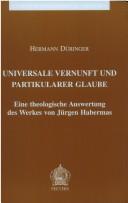
ISBN: 9042907274 9789042907270 Year: 1999 Volume: 19 Publisher: Leuven Peeters
Abstract | Keywords | Export | Availability | Bookmark
 Loading...
Loading...Choose an application
- Reference Manager
- EndNote
- RefWorks (Direct export to RefWorks)
Welche Bedeutung kommt dem Komplex Religion/Theologie/Kirche in dem sozialpolitischen Werk von Jürgen Habermas zu? Die umfassende Untersuchung von Hermann Düringer kommt zu dem Schluß, daß Habermas in seiner Theorie des kommunikativen Handelns und in seiner Reflexion über Nachmetaphysisches Denken den Gehalten der jüdischen und christlichen Tradition eng verbunden bleibt. Besonders eng gerade dort, wo er sich 'methodisch atheistisch' dem philosophischen Diskurs der Moderne verpflichtet fühlt und sich dem theologischen Diskurs entzieht. Diese Haltung kann als Analogie zu dem Umschlag von Mystik in Aufklärung gesehen werden, auf den Habermas sich bezieht. Der Untertitel nennt sich 'theologische Auswertung'. Er möchte eine religionsphilosophisch-kritische Wertschätzung des Werkes von Jürgen Habermas zum Ausdruck bringen und einen Beitrag leisten, das Habermassche Werk für den theologischen, insbesonder kirchentheoretischen Diskurs auszuwerten. Wen der Titel 'Universale Vernunft und partikularer Glaube' zu einer Gegenthese provoziert, liegt richtig. Das Buch versteht sich als ein Kapitel dialektischer Theologie.
Religious studies --- Habermas, Jürgen --- Theologie --- Théologie --- Philosophy --- Theory of religion --- Habermas, Jürgen --- 215.3 --- 1 HABERMAS, JÜRGEN --- Openbaring en rationalisme (rede) --- Filosofie. Psychologie--HABERMAS, JÜRGEN --- 1 HABERMAS, JÜRGEN Filosofie. Psychologie--HABERMAS, JÜRGEN --- 215.3 Openbaring en rationalisme (rede)
Book
ISBN: 0262700239 0262200430 0333275519 9780262700238 9780262200431 9780333275511 Year: 1983 Publisher: London Macmillan
Abstract | Keywords | Export | Availability | Bookmark
 Loading...
Loading...Choose an application
- Reference Manager
- EndNote
- RefWorks (Direct export to RefWorks)
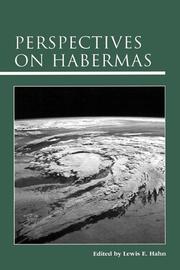
ISBN: 0812694279 0812694260 9780812694260 9780812694277 Year: 2000 Publisher: Chicago, Ill. Open Court
Abstract | Keywords | Export | Availability | Bookmark
 Loading...
Loading...Choose an application
- Reference Manager
- EndNote
- RefWorks (Direct export to RefWorks)
Habermas, Jürgen --- Habermas, Jürgen, --- 1 HABERMAS, JÜRGEN --- Filosofie. Psychologie--HABERMAS, JÜRGEN --- Habermas, Jurgen --- Habŏmasŭ, Wirŭgen --- Habŏmasŭ --- Khabermas, I︠U︡. --- Khabermas, I︠U︡rgen --- Ha-pei-ma-ssu, Yu-erh-ken --- Habeimasi --- הברמאס, יורגן --- יורגן הברמס --- 哈贝马斯 --- 1 HABERMAS, JÜRGEN Filosofie. Psychologie--HABERMAS, JÜRGEN --- Habermas, Jürgen. --- Habermas, Jürgen. --- Habermas, Jürgen --- Habermas, Jürgen, - 1929 --- -1 HABERMAS, JÜRGEN --- -Habermas, Jürgen
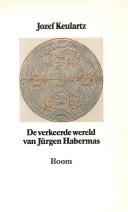
ISBN: 9060092600 9789060092606 Year: 1992 Publisher: Meppel Boom
Abstract | Keywords | Export | Availability | Bookmark
 Loading...
Loading...Choose an application
- Reference Manager
- EndNote
- RefWorks (Direct export to RefWorks)
Habermas, Jürgen --- Habermas, Jürgen, --- Habermas, Jürgen --- 1 HABERMAS, JÜRGEN --- Filosofie. Psychologie--HABERMAS, JÜRGEN --- Habermas, Jurgen --- Habŏmasŭ, Wirŭgen --- Habŏmasŭ --- Khabermas, I︠U︡. --- Khabermas, I︠U︡rgen --- Ha-pei-ma-ssu, Yu-erh-ken --- Habeimasi --- הברמאס, יורגן --- יורגן הברמס --- 哈贝马斯 --- Theses --- 1 HABERMAS, JÜRGEN Filosofie. Psychologie--HABERMAS, JÜRGEN --- Habermas, Jürgen. --- Habermas, Jürgen. --- Habermas, Jürgen, - 1929 --- -1 HABERMAS, JÜRGEN --- -Habermas, Jürgen
Book
ISBN: 9789028944190 9789086870011 Year: 2007 Volume: *7 Publisher: Kapellen Pelckmans
Abstract | Keywords | Export | Availability | Bookmark
 Loading...
Loading...Choose an application
- Reference Manager
- EndNote
- RefWorks (Direct export to RefWorks)
Political philosophy. Social philosophy --- Legal theory and methods. Philosophy of law --- Habermas, Jürgen --- Academic collection --- #GGSB: Filosofie (21e eeuw) --- #GGSB: Rechtsfilosofie --- #GGSB: Politieke filosofie --- 1 HABERMAS, JÜRGEN --- 211 Politieke filosofie --- 100 Recht --- Filosofie. Psychologie--HABERMAS, JÜRGEN --- 1 HABERMAS, JÜRGEN Filosofie. Psychologie--HABERMAS, JÜRGEN --- Contributions in philosophy of law --- Contributions in philosophy of political science --- Filosofie (21e eeuw) --- Rechtsfilosofie --- Politieke filosofie
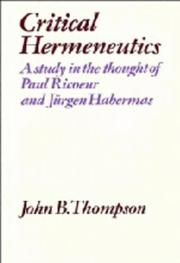
ISBN: 052123932X 0521276667 0511609175 9780521239325 9780511609176 9780521276665 Year: 1981 Publisher: Cambridge
Abstract | Keywords | Export | Availability | Bookmark
 Loading...
Loading...Choose an application
- Reference Manager
- EndNote
- RefWorks (Direct export to RefWorks)
This is a study in the philosophy of social science. It takes the form of a comparative critique of three contemporary approaches: ordinary language philosophy, hermeneutics and critical theory, represented here respectively by Ludwig Wittgenstein, Paul Ricoeur and Jürgen Habermas. Part I is devoted to an exposition of these authors' views and of the traditions to which they belong. Its unifying thread is their common concern with language, a concern which nonetheless reveals important differences of approach. For whereas ordinary language philosophers tend to treat linguistic activity as the ultimate object of inquiry, both Ricoeur and Habermas regard it as a medium which betrays more fundamental dimensions of human experience and the social world. Part II complements the exposition with a critical analysis of its central themes: the conceptualisation of action, the methodology of interpretation, and the theory of reference and truth. The author defends many aspects of the work of Ricoeur and Habermas, such as the emphasis on power and ideology, the strategy of depth interpretation, and the link between consensus and truth; but he argues that there are serious deficiencies and obscurities in their work. He proposes solutions to these difficulties and concludes with a sketch of a critical and rationally justified theory for the interpretation of action - a critical hermeneutics.
Theory of knowledge --- Habermas, Jürgen --- Ricoeur, Paul --- Social sciences --- Philosophy --- -Behavioral sciences --- Human sciences --- Sciences, Social --- Social science --- Social studies --- Civilization --- -Philosophy --- Ricœur, Paul --- Social philosophy --- Social theory --- Arts and Humanities --- 1 RICOEUR, PAUL --- 1 HABERMAS, JÜRGEN --- 1 HABERMAS, JÜRGEN Filosofie. Psychologie--HABERMAS, JÜRGEN --- Filosofie. Psychologie--HABERMAS, JÜRGEN --- 1 RICOEUR, PAUL Filosofie. Psychologie--RICOEUR, PAUL --- Filosofie. Psychologie--RICOEUR, PAUL --- Social sciences - Philosophy --- Philosophy.
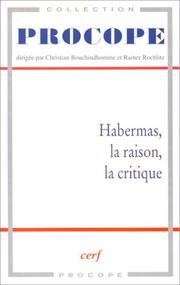
ISSN: 11502649 ISBN: 2204053791 9782204053792 Year: 1996 Publisher: Paris : Cerf,
Abstract | Keywords | Export | Availability | Bookmark
 Loading...
Loading...Choose an application
- Reference Manager
- EndNote
- RefWorks (Direct export to RefWorks)
Habermas, Jürgen, --- Habermas, Jürgen --- 1 HABERMAS, JÜRGEN --- Filosofie. Psychologie--HABERMAS, JÜRGEN --- Habermas, Jurgen --- Habŏmasŭ, Wirŭgen --- Habŏmasŭ --- Khabermas, I︠U︡. --- Khabermas, I︠U︡rgen --- Ha-pei-ma-ssu, Yu-erh-ken --- Habeimasi --- הברמאס, יורגן --- יורגן הברמס --- 哈贝马斯 --- 1 HABERMAS, JÜRGEN Filosofie. Psychologie--HABERMAS, JÜRGEN --- Habermas, Jürgen --- Habermas, Jürgen. --- Habermas, Jürgen. --- Habermas, Jürgen, - 1929 --- -Habermas, Jürgen, - 1929- - Philosophische Diskurs der Moderne
| Listing 1 - 10 of 45 | << page >> |
Sort by
|

 Search
Search Feedback
Feedback About UniCat
About UniCat  Help
Help News
News